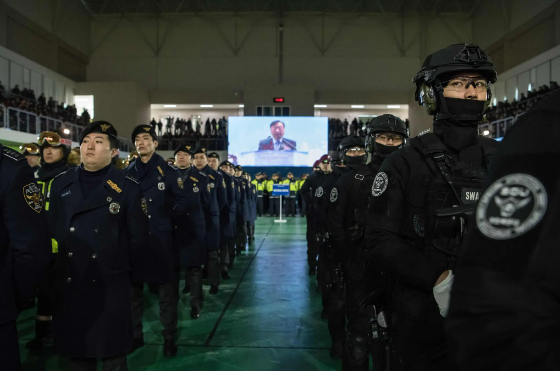
。。。埃德·琼斯/法新社 — 盖蒂图片社
我们每天发表一篇文章来表彰第五届年度学生社论大赛的前 10 名获奖者。
下面是Joanne Yang的一篇文章,15岁。
For the first time in sixty years, the two Koreas stood undivided. The Pyeongchang Olympics will be marked in history as a symbolic breakthrough for supposedly all Koreans bursting in patriotism. We even glorified it to the extent of shifting South Korea’s policies toward imminent reunification. But did one unified women’s hockey team and flag really alleviate the tensions in the Korean Peninsula? The sporting event may just be a red herring for what is truly happening behind the scenes.
Even with the romanticization of the Olympics, we should not let our guard down about Kim Jong-un’s ulterior motives. “The North may use the Games as a political propaganda opportunity to show that while they may be a nuclear power, they also want to have peace with their neighbors,” said Shin Beom-chul, an expert at Korea National Diplomatic Academy. It is patently obvious that the Winter Games in Pyeongchang were used merely as a “public image makeover” to gain political leverage while the status quo remains greatly unchanged. North Korea is not interested in diplomatically giving up its nuclear program or reunifying unless the conditions are favorable to Kim Jong-un and his regime.
Not only that, the Olympics did not revive the deteriorating relationship between the two countries and the increasingly obsolete concept of reunification. Being a Korean youth myself, I share the majority opinion that there is “more for [our] country to lose than to gain if the two Koreas become united.” Having grown up in an era demonizing North Korea under the conservative Saenuri Dang party, intimidated by the everyday prospect of nuclear war, and challenged by soaring unemployment rates in our country, we are skeptical of a unified Korea, let alone our capacity to accommodate its prodigious cost of $3 trillion.
Though talks of reconciliation have increased as seen in the changing language of the 2007 and 2000 inter-Korean summits, South Korea’s official policy treated it as the first step toward the final political scheme of reunification. But rather than treating reconciliation as a means to an end, what would treating it as the end do for lasting peace?
By eradicating the remnants of our symbolic dream of reunification, we can officially recognize North Korea as an autonomous country and diminish the necessity of its nuclear proliferation used as a deterrent for foreign invasion. Our adamant refusal to legitimize North Korea’s regime exacerbated its political insecurity to the brink of nuclear warfare.
South Korea should stop being fooled by the symbolic role the Olympics played and redirect its focus solely to reconciliation with a sovereign North Korea instead of clinging onto the abandoned dream of reunification.
Works Cited
Kim, Max. “The Korean Unification Flag Isn’t as Unifying as It Seems” The Atlantic, 9 Feb. 2018.
Lee, Cheoleon. “Gallup World Poll: Implications of Reunification of Two Koreas.” Gallup, 12 Oct. 2006.
Qin, Amy.“Protecting an Olympics Held in North Korea’s Nuclear Shadow.” The New York Times, 1 Feb. 2018.
Phillips, Tom. “Costly and Complicated – Why Many Koreans Can’t Face Reunification.” 9 Oct. 2015.
Revesz, Rachael. “North Korea Crisis: Re-unification Alone ‘Would Cost $3 trillion’ After War, Professor Says.” The Independent, 30 April 2017.
Sang-Hun, Choe. “North Korea to Send Olympic Athletes to South Korea, in Breakthrough” The New York Times, 8 Jan. 2018.